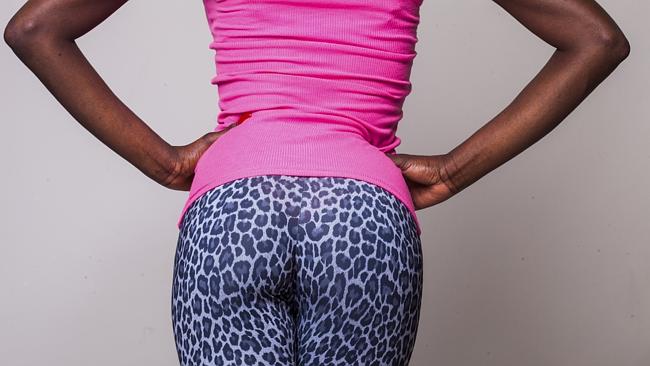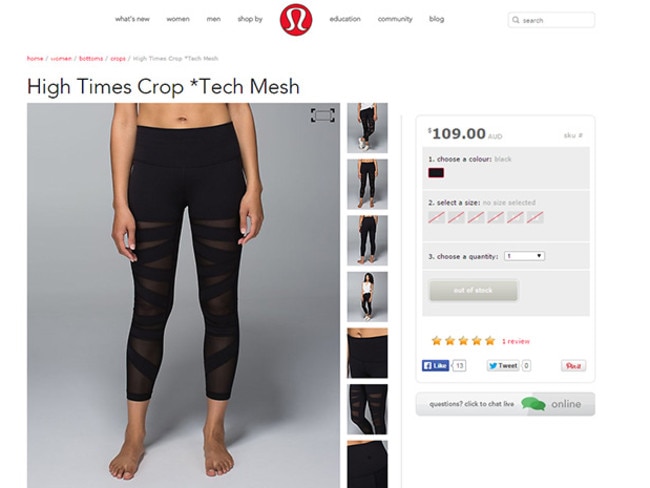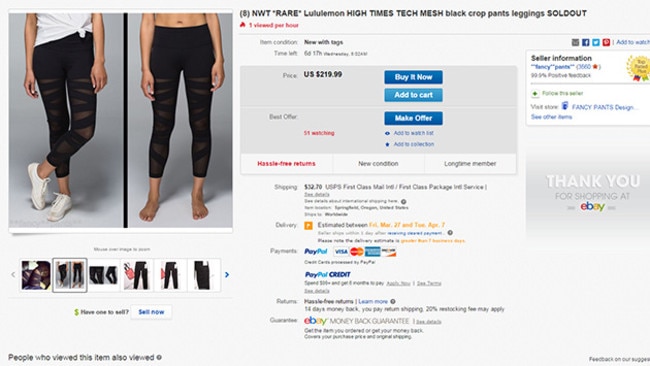Obsessed Lululemon fans are paying hundreds for sold-out styles online
OBSESSED Lululemon fans are paying hundreds of dollars for sold-out styles of their famous ‘butt-tastic’ workout leggings online but little do they know they’re being duped ... big time.

“DOES anyone know if/when the relax fit pant is coming back?! I have literally been checking the website everyday since January!!! I’ve been dyiiiing for these pants!” begs one commenter on the Lululemon Addict blog, which has 13,000 Facebook fans.
Another pleads, “Does anybody know if the everyday yoga jacket is coming back? I left mine somewhere — big gap in my life.”
For devoted followers of fashion, there’s nothing quite like the heartache of a coveted item selling out. For diehard fans of cult activewear brand Lululemon, that pain seems to be especially acute.
Exercise gear is no longer worn just at the gym. Swarms of lithe, wealthy women now pound inner city pavements wearing $129 leggings to brunch, while shopping and doing the school run.
The activewear trend has well and truly arrived and this “yoga-inspired athletica” company is riding it, hard.

Lululemon’s merchandising strategy runs on a ‘scarcity’ model. It only makes a limited number of garments in each style and doesn’t refresh stock once it sells out.
They release new styles each week — not uncommon in the age of fast fashion — but this strategy creates hype over new stock and panic once popular styles sell out.
So hordes of cashed-up fitness fanatics are turning to the Lululemon online resale market to try and hunt down that sports bra or patterned jacket they adore, but can’t purchase in a Lululemon store or on their website.
Jels, who declined to give her last name, runs a Lululemon fan blog called Our Daily Lemon with her cousin. The stay-at-home mum from California estimates she owns 50 pieces of Lululemon clothing.
“It’s unbelievable. I’m able to feed my habit by selling my old items online. If I see something new that I like, I go into my wardrobe and think, ‘OK, one of you has to go’,” she told news.com.au.
“I’ll make a purchase sometimes just based on what the resell [value] will be. And as long as people are buying it, Lululemon doesn’t complain.”

For example, take this pair of Lululemon leggings which have sold out in Australia and the US. They retail for $109 here.
Currently there are 40 international eBay users selling them for more than the RRP.
One US-based user is selling them for a whopping $US220 ($A288).

The Huffington Post reports a paid of plaid Lululemon shorts which came free to runners in a Vancouver marathon, sold for $1,300 in January. And a bright pair of Wunder Under leggings which retail between $US72 and $US102, sold for $US702.
Sound outrageous?
Well, professor of marketing and science at the University of South Australia, Byron Sharp, says this marketing hype is no accident.
“This exclusivity thing, it creates a bit of buzz for a while. People are chasing items and trying to get their hands on styles they couldn’t get at first.
“Department stores used to dominate the retail space and this has been replaced by fast fashion. Stores like Zara just pump out new designs all the time. So [Lululemon] are certainly claiming that space.”
But Professor Sharp says if frustrated customers — with credit cards ready and waiting — can’t purchase the items they want to — this strategy could backfire.
“It’s doomed as a long term business model, unless you want to stay small,” he says. “There’s a little bit of value in the publicity achieved by your stock selling out immediately and having queues at the door, but there’s a downside to it too. You could have sold more stock, and made more money!”

Lululemon’s CEO Laurent Potdevin is aware of this problem. The company is reportedly tweaking its practice of supplying a limited amount of stock and its strict 14 day returns policy is also under review.
“While we don’t mind our guests being hungry for our product, we don’t want them to starve for it,” he told Reuters.
Lululemon Australia declined to comment specifically on this story, but directed news.com.au to its resale and counterfeit policy:
“We completely recognise that once someone purchases our product they can do what they want with it. We do not, however, support those who acquire large volumes of our product to resell at an elevated price point.”
But when a brand that sells gym clothes is the fourth most in-demand on online shopping sites, behind the likes of Chanel and Louis Vuitton and ahead of Hermès and Tiffany & Co, they must be doing something right. Right?
rebecca.sullivan@news.com.au



